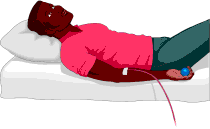This is an information booklet for patients with terminal kidney failure who have opted for kidney transplantation from a cadaver organ donor. This will provide you with answers to questions you may have about the Human Organ Preservation Effort (HOPE) and the transplant programs. It will enlighten you on several aspects of cadaver kidney transplantation- registering in the waiting list, complying with requirements and what to expect during and after transplantation
A Primer for
Prospective Cadaver Kidney Transplant Recipients
Cadaver organ donors are usually victims of strokes, head injuries or accidents and have been diagnosed as "brain dead". They are comatose, artificially kept alive by a respirator, unresponsive to pain or stimuli and have total absence of brain function. Their condition is irreversible and brain damage is permanent. They are DEAD although the heart may still be beating.
Brain death cases are referred to the National Kidney and Transplant Institute for potential organ donation by various private and government hospitals.Brain dead patients are ideal organ donors since the functions of transplantable organs can be temporarily maintained to keep them viable. The Transplant Staff of the NKTI will explain to the relatives of these patients the concept of organ donation to help numerous patients awaiting transplantation and a chance to return to a more normal life.
Patients requiring a cadaver organ donor have no suitable living related donor. In a living donor transplant, the work-up and transplant operation can be expeditiously scheduled to suit both recipient and donor. The patient and his donor are well prepared for the procedures, physically, emotionally and financially. The probablility of getting goood compatibility between recipient and donor is higher among blood relatives. This does not mean, however, that a dacaver donor, being totally unrelated to the recipient, will present a poor match. There is a fair chance for the patient to get a good match even with cadaver donors. With the current advances in immunosuppression, a "perfect match" is now considered not essential for a successful transplantation.
In a dacaver kidney transplantation, we cannot predict when a suitable donor will be available for the patient. The waiting time is indefinite so that the patient will have to be maintained by expensive dialysis treatment and must always be prepared for the unexpected donation. Cadaver kidneys are retrieved earlier from the donor and preserved in a special ice-cold solution until they are transplanted. However, the longer they stay in preservation, the greater is the possibility that the quality of the kidney will be affected. In our experience, it is best to transplant them within 36 hours. In some cases though, this can be extended to about 50 hours. The earlier the kidney transplanted, the better the kidney functions in the recipient and the patient experiences less difficulties.
This is why the Transplant Unit requires patients to comply with certain measures to facilitate immediate transplantation when a donor is available. The patient and his family are advised to visit the HOPE office to dicuss these measures. The requirements for cadaver organ donor pool enrollees are as follows:
1) Submit the following information:
a) Patient’s Name, age, sex, civil status, occupation, complete address (Metro Manila and Provincial), Telephone number(s).
b) Two neighbor’s telephone numbers and names. (Note, that these neighbors have to be informed beforehand that there is the possibility that they you will be contacted through them)
c) Two relatives’ telephone numbers and names.
d) Office address and telephone number.
e) Local barangay or Police Department and telephone numbers.
f) Date when dialysis started, present type and schedule of dialysis.
g) Patient classification (Private or Service), Attending Physician and Dialysis Unit.
We will need all this information so that the patient can be contacted immediately for possible transplant. Kindly request your neighbors or relatives to inform you right away whenever we call for you. Our call may come anytime of the day or night.
You must also be aware of the current estimate of expenses for the transplant operation. Aside from the hospital and operation expenses on the recipient, the total bill will include charges from the time of donor consent, i.e. medicines, laboratory examinations, other diagnostic procedures, funeral arrangement, etc. The patient must discuss these details with our financial counselor.
2) Clinical Abstract from Attending Physician; Recipient Checklist to be updated monthly:
The clinical abstract from your attending physician will give us a history of your condition and present to us any current complications. The monthly recipient checklist shall provide us with results of your recent laboratory examinations and also reflect problems that you may have. These are necessary in order to evaluate whether you are transplantable anytime there is an organ donor.
3) Blood Type and Complete Tissue Type (A, B, C, DR)
The complete tissue type is necessary to check your compatibility with the donor. Tissue typing is a procedure that is done only once for a patient.
4) Monthly Submission of Blood (10 cc clotted sample) and at least two weeks after a blood transfusion for storage at the Tissue Typing Laboratory. This is for Tissue Crossmatching with potential donors.
Matching examinations with a cadaver donor also include tissue crossmatching which is done every time a compatible donor is available. Monthly submission of blood is absolutely necessary for compliance. The blood samples are viable for one month so that all donors within one month from the date of submission may be matched with you. Tissue crossmatching is done simultaneously for all waiting patients. Thus, if your blood sample is not available or has exceeded its due date, you may not be considered for tissue crossmatching with the donor.
A deposit is required to cover advanced payment of tissue crossmatching charges and monthly storage fees. Service patients hsall secure a certification of agreed counterpart from the Social Service Department before proceeding to the cashier to settle the deposit. Patients shall obtain a Patient Deposit Control Booklet (PDCB) from the Cashier as proof of payment of the deposit. Patients shall present the PDCB to the Tissue Typing Laboratory Staff in order to qualify for monthly blood submission. If the patient is not chosen for transplantation from a possible donor because of incompatibility, the cost of tissue crossmatching shall be deducted from the deposit. The patient shall update his deposit level to the original amount accordingly for use in succeeding donors. Patients without deposits shall not be considered for tissue crossmatching when a potential donor is available.
5) Contact Transplant Coordinator (+63-2-924-0680) for updates on the patient’s condition, chage of address, inquiries, etc.
The HOPE staff must be contacted for any inquiries or problems that the patient or his family may have. Kindly keep us posted on the patient’s whereabouts. Please inform us whenever the patietn wishes to travel or transfer elsewhere than his designated address.
Immediate physical examination of patient for possible transplant when a compatible donor is available
Whenever a possible donor is available, the HOPE staff will contact you and instruct you to proceed to the NKTI immediately for physical examination and possible transplant. when this happens, do not delay the trip to the hospital. This may happen at the middle of the night or during weekends or holidays. Bring your personal things for possible admission and do not eat or drink from that time. A physical examination is done to ensure that you are fit for transplantation, i.e. there is no infection or contraindication for a transplant. Depending on the medical evaluation, you may have to undergo dialysis prior to transplantation.
You will not be allowed to eat or drink for about 12 hours before the transplant. Several blood tests, x-rays and electrocardiogram will be done. Soap sud enema is necessary to clean your bowels and you will be instructed to have a Phisohex shower before the operation. It is also necessary that shaving of the abdominal and inguinal area be done.
Intravenous fluids will have to be started as well as prophylactic antibiotics. The anesthesiologist will be visiting you and pre-medications will be given before you are brought to the operating room.
The transplant operation takes only about 3 to 4 hours. Your new kidney will be implanted in the lower part of your abdomen, usually on the right side. It may take a few days or a week for your kidney to become fully functional so that dialysis may have to be instituted until the funciton of the new kidney is adequate. If it does not function well immediately, it does not mean that it will not function satisfactorily in time.
Cadaver kidney transplantation may not give you the same length of time to prepare as in a living-related donor transplant. Our aim is to transplant the kidney into the patient at the soonest possible time.
We will call on you immediately when a possible donor becomes available. News of the donor may come unexpectedly and you may feel anxious or unprepared. However, you must always keep a strong and positive outlook. You have already decided that a kidney transplant is the best treatment for you. This is the moment you have been waiting for and NOW the chance is yours. Bear in mind the benefits that you will gain with a successful transplant—freedom from dialysis, normal diet and activities, rehabilitation, and most of all, a new lease on life.
The National Kidney and Transplant Institute (NKTI), a health agency seeking total answer to diseases of the kidney and urinary tract… prevention, treatment and cure. The Institute’s many faceted program brings help and hope to millions of Filipinos who suffer from kidney and urinary tract disease, through research, patients services, nationwide organ donor programs, professional education and public information.
Home | About HOPE | Patient Info Page | Contacts | Organ Donor Card | Acknowledgements | Queries

